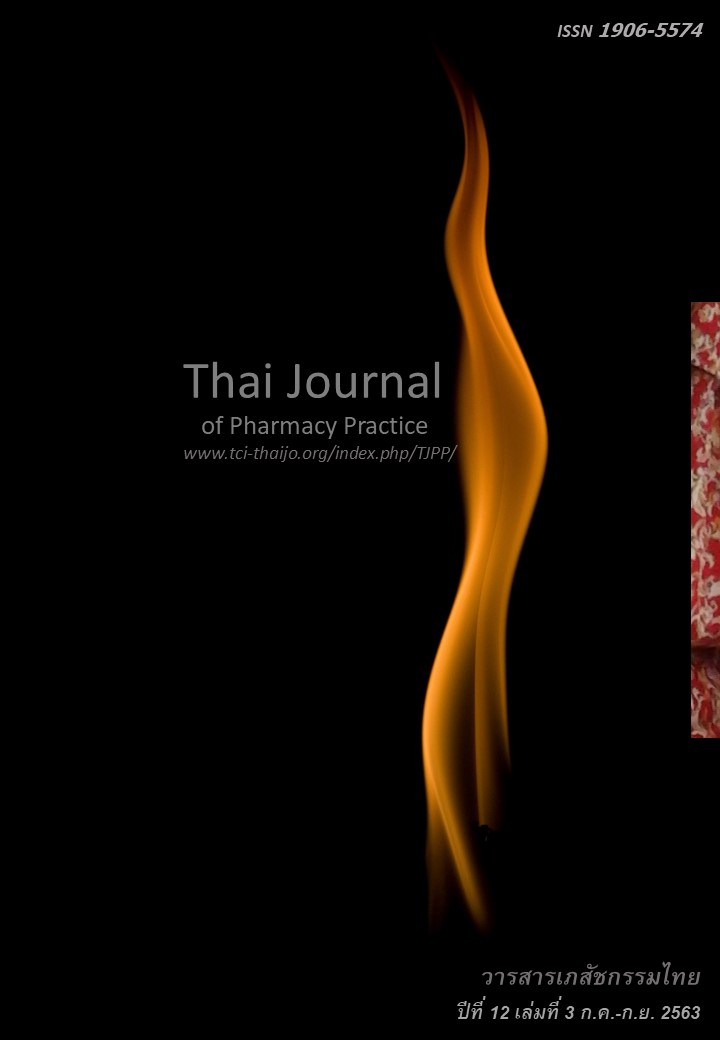ประสิทธิผลของโปรแกรมการบริบาลทางเภสัชกรรมเพื่อส่งเสริมความร่วมมือในการใช้ยาในผู้สูงอายุที่มีการได้รับยาหลายขนานในโรงพยาบาลชุมชนแห่งหนึ่งในจังหวัดกาญจนบุรี
Main Article Content
บทคัดย่อ
วัตถุประสงค์: เพื่อวัดประสิทธิผลของโปรแกรมการบริบาลทางเภสัชกรรม (pharmaceutical care based program: PCP) เพื่อส่งเสริมความร่วมมือในการใช้ยา (medication adherence: MA) ในผู้สูงอายุที่ได้รับยาหลายขนานในโรงพยาบาลชุมชนแห่งหนึ่ง วิธีการ: การศึกษานี้เป็นการวิจัยรูปแบบกลุ่มเดียววัด MA ก่อนและหลังการให้ PCP ในผู้ป่วยสูงอายุ 60 ปีขึ้นไปที่รับประทานยาโรคประจำตัวตั้งแต่ 4 ชนิดขึ้นไป มีระดับ MA ต่ำโดยเมื่อประเมินด้วยการนับเม็ดยาพบอัตรา MA น้อยกว่าร้อยละ 80 หรือมากกว่าร้อยละ 120 หรือคะแนนจากแบบสอบถามพฤติกรรมในการใช้ยาสำหรับคนไทย (MTB-Thai) น้อยกว่า 22 คะแนน PCP ดำเนินการตามคู่มือการให้ PCP ที่พัฒนาขึ้นเพื่อเป็นแนวทางในการทำกิจกรรมส่งเสริม MA ซึ่งประกอบด้วยการให้ความรู้ การส่งเสริมพฤติกรรมการรับประทานยา เช่น การจัดยาเป็นชุดพร้อมรับประทานและการทบทวนการใช้ยา การดำเนินการ PCP มี 2 ครั้ง คือ ที่คลินิกโรคเรื้อรังเมื่อเริ่มการศึกษา และในสัปดาห์ที่ 4 และติดตาม MA ในสัปดาห์ที่ 4 และ 8 ผู้ป่วยมี MA ระดับดี หากผลการนับเม็ดยาอยู่ในช่วงร้อยละ 80-120 และผลการสอบถาม MA ด้วย MTB-Thai มีคะแนนตั้งแต่ 22 ขึ้นไป ผลการวิจัย: ผู้ป่วยสูงอายุที่เข้าในการศึกษามี 30 ราย เป็นเพศหญิง 26 ราย อายุเฉลี่ย 70.4 ± 9.0 ปี ผู้ป่วยทั้งหมดมีโรคประจำตัว 2 โรคขึ้นไปโดยอย่างน้อยเป็นโรคเบาหวาน โรคความดันโลหิตสูง หรือโรคไขมันผิดปกติ รายการยาโรคประจำตัวที่ได้รับต่อวันเฉลี่ย 7.0 ± 1.8 รายการ ปัญหาความไม่ร่วมมือการใช้ยาที่พบบ่อยคือ การไม่ได้รับประทานยาบางมื้อ (24 ราย) และการขาดยาหรือหยุดยา (15 ราย) กิจกรรมส่งเสริม MA ที่ใช้ส่วนใหญ่คือ การให้ความรู้ประกอบคำแนะนำ และการทบทวนการใช้ยา ระดับ MA ในยาโรคประจำตัวโดยเฉลี่ยเมื่อเริ่มต้นการศึกษาและสิ้นสุดการศึกษาโดยวิธีนับเม็ดยาเท่ากับร้อยละ 70.47 และร้อยละ 96.61 ตามลำดับ และโดยวิธี MTB-Thai มีค่ามัธยฐานเท่ากับ 19 คะแนน และ 23 คะแนน ตามลำดับ ซึ่งเพิ่มขึ้นอย่างมีนัยสำคัญทางสถิติ (p < 0.001) ผู้ป่วยที่มี MA ระดับดีเพิ่มขึ้นอย่างชัดเจนเป็น 21 รายตั้งแต่สัปดาห์ที่ 4 และเพิ่มขึ้นอีกเป็น 27 รายในสัปดาห์ที่ 8 สรุป: PCP ที่พัฒนาขึ้นมีแนวทางการดำเนินการที่ชัดเจนในการเลือกเครื่องมือหรือกิจกรรมที่หลากหลายซึ่งสามารถส่งเสริม MA ในผู้สูงอายุที่ได้รับยาหลายขนานให้เหมาะสมกับผู้ป่วยแต่ละรายได้
Article Details
ผลการวิจัยและความคิดเห็นที่ปรากฏในบทความถือเป็นความคิดเห็นและอยู่ในความรับผิดชอบของผู้นิพนธ์ มิใช่ความเห็นหรือความรับผิดชอบของกองบรรณาธิการ หรือคณะเภสัชศาสตร์ มหาวิทยาลัยสงขลานครินทร์ ทั้งนี้ไม่รวมความผิดพลาดอันเกิดจากการพิมพ์ บทความที่ได้รับการเผยแพร่โดยวารสารเภสัชกรรมไทยถือเป็นสิทธิ์ของวารสารฯ
เอกสารอ้างอิง
National Statistical Office. The 2014 survey of the older persons in Thailand [online]. 2014 [cited Feb 28, 2017]. Available from: service.nso.go.th/nso /nsopublish/themes/files/elderlyworkFullReport57-1. pdf
Population Division of United Nations. World popula- tion 2011 [online]. 2011 [cited Jan 16, 2016). Available from: www.un.org/esa/population/.
Foundation of Thai Gerontology Research and Development Institute. Situation of the Thai elderly. Bangkok: Pongpanich-chareonbhol; 2011.
Hayes BD, Klein-Schwartz W, Barrueto F, Jr. Poly pharmacy and the geriatric patient. Clin Geriatr Med 2007; 23: 371-90.
Abdulraheem IS. Polypharmacy: A risk factor for geriatric syndrome, morbidity &mortality. Aging Sci 2013; 1: e103.
Claxton AJ, Cramer J, Pierce C. A systematic review of the associations between dose regimens and medication compliance. Clin Ther 2001; 23: 1296–310.
Thanomsat K, Tapasee W. The study of drug compliance behaviors model of elders with hyper tension in community. Area Based Development Research Journal 2015; 7: 36-49.
Chaimeekhieo N, Srisaenpang P. Medication self-management among older persons with multimor bidity in community. Journal of Nursing and Health Care 2017; 35: 148-157.
Jitapunkul S. Elderly and elderly population: principles of geriatric medicine. 2nd ed. Bangkok: Chulalongkorn University; 2001.
Sakthong P, Sonsa-Ardjit N, Sukarnjanaset P, Munpan W,Suksanga P. Development and psychometric testing of the medication taking behavior in Thai patients (MTB-Thai). Int J Clin Pharm 2016; 38: 438-45.
Sthapornnanon N. Medication nonadherence. Thai Bulletin of Pharmaceutical Sciences 2012; 7: 23-36.
Department of Mental Health, Ministry of Public Health. Basic counseling. 3rd rd. Bangkok: War Veterans Organization of Thailand Printing; 2004.
Department of Mental Health, Ministry of Public Health. Motivation counseling for non-communica- ble diseases; NCD. Bangkok: Beyond publishing; 2014
Ploylearmsang C, Teinkanitikul K, Choppradit J, Soontron S, Suwankasawong W. Development of medicine list for screening and reducing medication-related problems in Thai elderly [online]. 2011 [cited Jan 8, 2015]. Available from: hdl.han dle.net/11228/4244.
American Geriatrics Society 2015 Beers Criteria Update Expert Panel. American Geriatrics Society 2015 updated Beers criteria for potentially inappropriate medication use in older adults. J Am Geriatr Soc 2015; 63: 2227-46.
O’mahony D, O’sullivan D, Byrne S, O’connor MN, Ryan C, Ryan C, et al. STOPP/START criteria for potentially inappropriate prescribing in older people. Age Ageing 2014; 44: 213-8.
Leetaweesuk J, Makee P, Charachan P, Yana P, Jindawattanawong P, Thiratanyaboon L, et al. Drug use behaviors of elderly patients with chronic disease in Chiang-Tong community Rahang Sub-District, Muang-Tak District, Tak Province [online]. 2018 [cited Aug 9, 2018). Available from: bit.ly/2wi S5a5.
Ploylearmsang C, Kerdchantuk P, SoonKang K, Worasin P, Kedhareon P. Drug-related problems and factors affecting on drug use problems in elderly of Banmakok, Kantharawichai, MahaSara- kham Province. Journal of Science and Technology Mahasarakham University 2013; 16: 803-12.
Ruangritchankul S. Polypharmacy in the elderly. Ramathibodi Medical Journal 2017; 41: 95-104.
Sripakdee W, Kaewmanee P, Wongseetrang K, Jiumwatchara R, Joeikaew C. Adherence to tyrosine kinase inhibitors in patients with chronic myeloid leukemia. Thai Journal of Pharmacy Practice 2018; 10: 534-41.
Wangjhi N, Boonyasopun U, Sikeaw M. Effect of behavioral modification program on medical adherence and blood pressure for muslim elderly with uncontrolled hypertension. The 38th National Graduate Research Conference; 2016 Feb 19-20; Phitsanulok, Thailand. Naresuan University; 2016. p.835-46.
Lee, J.K., Grace, K.A., Taylor, A.J. Effect of a pharmacy care program on medication adherence and persistence, blood pressure, and low-density lipoprotein cholesterol: a randomized controlled trial. JAMA. 2006; 296: 2563-71.
Thanomsat K, Tapasee W. The study of Drug Compliance Behaviors Model of elders with hypertension in community. Area Based Development Research Journal 2015; 7: 36-49.
Rungsawang S. Factors related to polypharmacy medication adherence among older persons with chronic illness. Journal of Nursing, Siam University 2017; 35: 6-19.
Balkrishnan R. Predictors of medication adherence in the elderly. Clin Ther 1998; 29:764-771.
Hawe P, Higgins G. Can medication education improve the drug compliance of the elderly? Evaluation of an in hospital program. Patient Educ Couns 1990;16,151-60.
Costa E, Giardini A, Savin M, Menditto E, Lehane E, Laosa O, et al. Interventional tools to improve medication adherence: review of literature. Patient Prefer Adherence 2015; 9: 1303-14.
Chalongsuk R, Kapol N. Communication as support in the effectiveness of drug use in the elderly. Thai Bulletin of Pharmaceutical Sciences 2011; 6: 1-15.
Chanthawong S. Preventable adverse drug event in elderly patients receiving polypharmacy [online]. 2018 [cited Dec 18, 2018). Available from: ccpe.pharmacycouncil.org/index.php?option=article_detail&subpage=article_detail&id=518.


